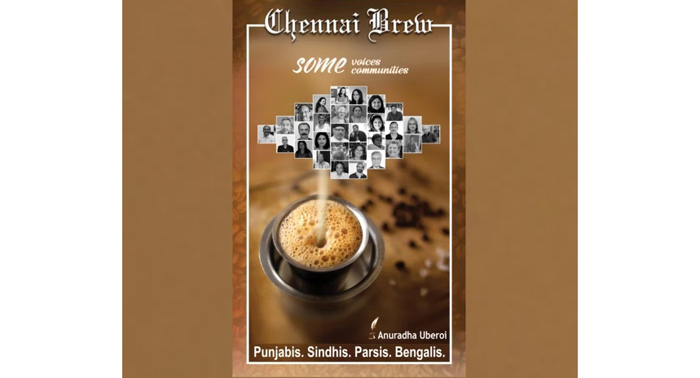Chennai Brew: Going beyond coffee, connecting communities

Kolkata/Chennai: This is ‘brewed’ in Chennai, but it is not coffee. It is a book titled Chennai Brew Some Voices Some Communities. Penned by debutante author Anuradha Uberoi, the book carrying a foreword by Dr. Kiran Bedi, Lt. Governor of Puducherry, was launched in Chennai recently.
It is anthropological in nature and traces the journey and the lives of the people belonging to the four communities – Bengali, Punjabi, Sindhi and Parsi – who ‘uprooted themselves from North India and came to the unfamiliar South.’ It talks about the challenges that the early settlers faced when they arrived in then Madras.
As one guess one understanding and learning Tamil was one of their biggest challenges for them. The books recounts how the members overcame this challenge, how they adopted and adapted in this new city while preserving and upholding the distinct identity of their respective communities.
Talking to eNewsroom right after the launch over the phone, Anuradha Uberoi, stated, “I have been living in Chennai for the last 31 years and have been associated with the field of organizational development for more than 25 years. A few years ago, I was asked to give a talk on the Punjabi community in Chennai as a part of Madras Week. This talk was highly appreciated and many suggested that I should write a book on the journey of the Punjabis in Chennai. This got me thinking and I thought: ‘Why confine myself only to Punjabis? Why not talk about the Bengalis, Sindhis Punjabis and Parsis who arrived in Chennai predominantly from North India and settled here?’ And that is how this voyage started. It has taken me three years to write the book.”

When one browses through the book, one can make out that meticulous research forms the backbone of this book that focusses on the behaviour, culture, traditions, customs, eccentricities, the quirks, pet peeves of these four communities in an engaging and humourous manner. It also showcases how ‘the current generation of settlers view its ethnicity’ and meshes their viewpoints with the reminiscences of the older generation.
“Yes! A lot of research has gone into shaping this book, but I have not consulted any experts. You will find that the book is filled with heart-warming anecdotes, nostalgic stories, old photographs and memorabilia. People from these respective communities happily shared these with me and also talked about their quirks et al. Everything has been told to me. I have not insinuated anything. The descriptions of the behaviour, culture, traditions etc., that the book touches upon hold good for these four communities residing not only in Chennai but also in other parts of India and the world as well,” informed Uberoi.
As one turns the pages of the book, one learns that the people from these four communities arrived in then Madras either because of ‘reversal in fortunes’ or to ‘further their business interests’ or ‘simply to get a good job’. The railways were a big draw back then – jobs at the coach factories were opening up and the railways also needed the services of qualified engineers. Next in line was the leather institute and back in those days, Bengalis were usually the only race that had PhDs. So, they were appointed as teachers at the leather institute. They also got admission at IIT Madras and eventually started teaching there as well. The thriving movie industry also beckoned the Bengalis. Thus, talented make-up artists and technicians arrived in Chennai and made it their home.

“While working on the book, people from the Bengali community explained to me how they consider themselves to be ‘studious’ and are not ‘overtly ambitious’. I discovered their reverence for Rabindranath Tagore and how proud they are of their cultural heritage. How celebrating Durga Puja in all its glory and indulging in adda completes them,” stated Uberoi.
The pages of Chennai Brew Some Voices Some Communities enlightens the reader that Chennai is also home to the Parsi community. “When I visited people from this community, they confessed that they are very “clannish” and how they would die without non-vegetarian food. But seriously, the Parsis are very pleasant, helpful, non-judgemental and enrich the city. The total number of Parsis in Chennai at present stands at 207. While the country is reeling under the pressure of increasing population, this community is shrinking rapidly and that is such a pity,” apprised Uberoi during her conversation with eNewsroom.
The book filled with photographs that speak a thousand words also fascinatingly portrays how the Sindhis adopted the local customs when they arrived in Chennai and mastered the Tamil language. “In the old days, a large number of young men used to accompany and travel with the elders. These men learnt on-the-job and eventually set up their successful business ventures in Chennai. They are very enterprising and I was even informed about how a few people from the community managed to make a fortune by selling our normal local handkerchiefs as scarves in Nigeria,” added Uberoi.
And what about Punjabis? “This community is a vibrant one and full of joie de vivre. They have come a long way since Partition. They are educated, resourceful, dynamic and are known for their warmth and hospitality. They have adapted to the ways of Chennai very well. You will not find one Punjabi on the roads of Chennai who cries, ‘Janta nehi main kaun hu? (Don’t you know who I am)?’ unlike their counterparts in New Delhi,” affirmed Uberoi with a smile and signed off by stating, “Chennai Brew Some Voices Some Communities celebrates people and asserts that although we might seem to be different on the surface, deep down, we are the same. We are the citizens of this great nation with the same core values.”






